TACOMA, Wash. — The Tacoma Fire Department said it is in need of new engines and facilities but said it does not have consistent funding to buy them.
This November, Tacoma residents will vote yes or no on a levy that would boost funding for the fire department. The measure was just approved to be on the ballot last month.
The department said there is a vital need for updated equipment and facilities in order to improve its worsening response times.
“We're running thin and we just really need to stabilize our foundation,” said Interim Tacoma Fire Department Chief Sionna Stallings-Ala'ilima.
The Tacoma Fire Department has experienced a 32% increase in calls between 2003 and 2023 and the department’s interim chief said this is putting a strain on their aging equipment.
Stallings-Ala'ilima said 60% of their first response units are at or past their useful life.
“We have five engines that are running twice as many calls as we would want them to be,” said Stallings-Ala'ilima. “We're seeing more and more failures, so it's concerning because they're not adequately providing for safety and reliability when we rely on emergency response events.”
Not only are the rigs old, so are many of their fire stations. Some are more than 100 years old, while others are too small to house the rigs needed in those areas.
The Interim Chief said the stations desperately need repairs and operational upgrades, and that the city built many stations before firefighter health and safety was a priority.
“If we were to walk through this right here that's where their sleeping quarters are, right back there is their kitchen and living room,” said Stallings-Ala’ilima referring to a door connected to the bay the trucks park in. “So as that door opens, any exhaust or any fumes from the night before, all of those are just going into the living area.”
She said these challenges paired with the increase in calls have caused the department’s response times to get longer.
“We are far below the standard and that- that deficit gets worse every year as our call volume increases,” said Stallings-Ala’ilima. “The standards that we would hope to be meeting we’re nowhere near.”
She said the Tacoma Fire Department does not have a consistent funding source for things like equipment, facilities, and vehicles.
That's why this November Tacoma voters will decide if they want to approve a levy to help fund the fire department's needs. This is a permanent levy, but the terms and amount of the levy voted on this year would only be in effect through the year 2030.
The proposed levy would generate $30 million dollars per year. Around $10 million would go towards operations and staffing, about $8 million towards facilities, and about $5.7 would go towards purchasing engines, ladders and other first response equipment.
This levy would increase property taxes for people living in Tacoma by 65 cents for every $1,000 of the assessed value of their home. For the average Tacoma homeowner, that would come out to be around $25 dollars more in taxes per month.
“We know that money is tight. We serve this in this community, and we see that people are really struggling to make ends meet,” acknowledged Stallings-Ala’ilima.
If the levy does not pass, the department says equipment will continue to deteriorate, but said no matter what they will continue to serve and protect.
“We will continue to do our best, but it would really help us stabilize and prepare for the future of our services if the levy did pass,” said Stallings-Ala’ilima.
Last year a levy passed to help fund emergency medical services in Tacoma, which added $9 per month to property taxes for the average Tacoma homeowner. The goal of that levy was to add additional EMS units and cover some out-of-pocket costs related to ambulance transport for Tacoma residents.
RELATED: Tacoma's Emergency Medical Services levy lid lift passing after latest ballot count
The current proposed levy’s webpage states that the reasons for the increase in call volume include an increase in population and more people calling 911 as their primary healthcare provider. It said this is due to a lack of access to health care and mental health resources, especially impacting people who are unhoused.

